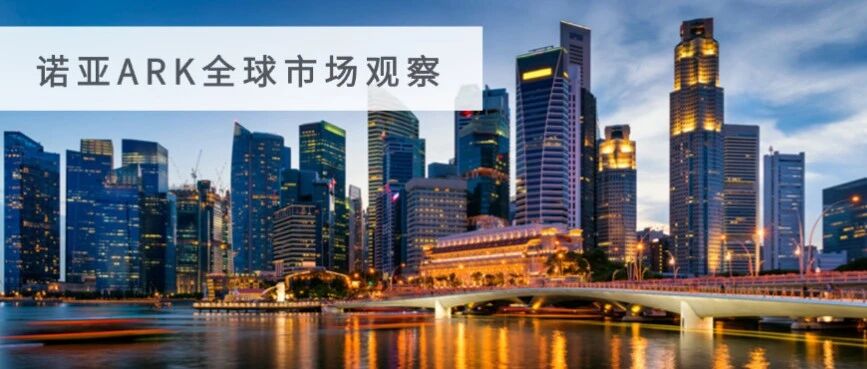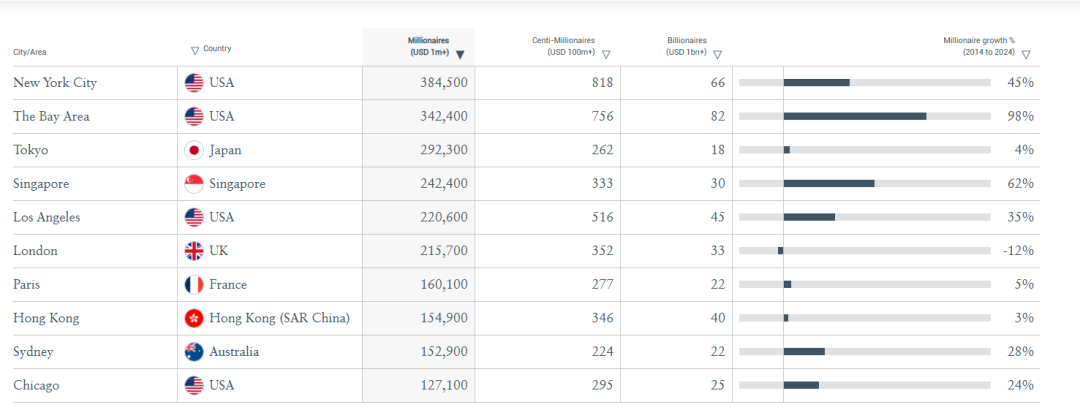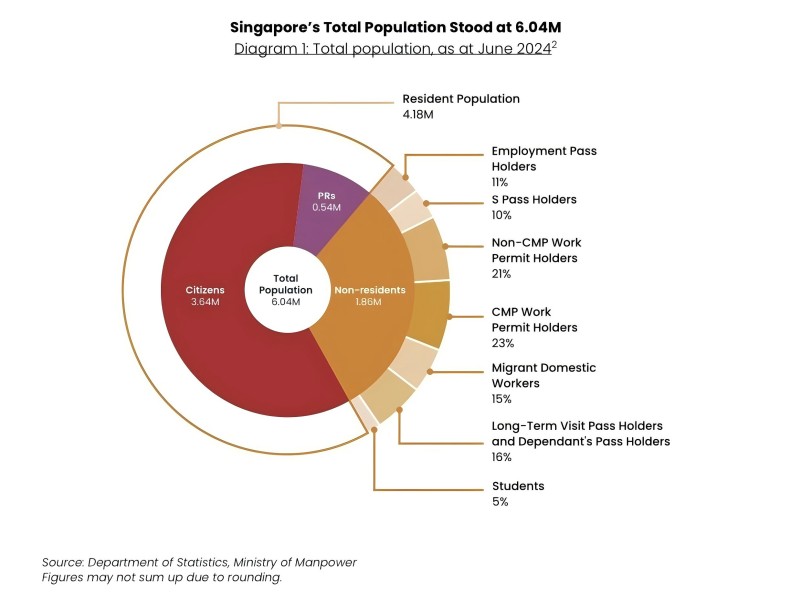

The map of global wealth flows is entering a critical period of rapid transformation. In Southeast Asia's strategic landscape, Singapore has emerged as a powerful new wealth center, commanding international attention through its unique combination of stability and strength. Today's Singapore has long broken free from its singular identity as a "Southeast Asian trade hub." By leveraging multiple strategic advantages, it has become a premier destination for global high-net-worth (HNW) individuals seeking sophisticated wealth management, family succession, and multinational asset allocation.
This rise is no accident. Authoritative data from the World's Wealthiest Cities Report 2025, jointly released by Henley & Partners and New World Wealth, shows that Singapore is home to 242,400 affluent individuals with "over US$1.0 million in investable assets." The city-state ranks fourth globally and has recorded remarkable growth of over 60% since 2015—far surpassing traditional financial centers like New York and London. These figures powerfully demonstrate Singapore's magnetic appeal to global wealth and validate its position as a premier wealth management hub.

World's Wealthiest Cities Report 2025
As early as 2018, Noah ARK proactively established a presence in Singapore. After years of deepening and refining its local operations, Noah ARK officially upgraded Singapore to its global headquarters in 2025.
Noah ARK will continue to leverage Singapore's status as a mature international financial center and its rigorous, comprehensive regulatory system. We will create tailor-made, full life-cycle wealth management solutions for global Chinese investors, precisely addressing their diverse needs in asset allocation, risk hedging, and family succession.
In this issue of Global Market Watch, Noah ARK will draw on its deep, practical experience in the Singapore market to help you find the key answer: what exactly has allowed Singapore to secure its core advantages amid fierce global wealth competition.
Cross-Border Channels — The "Bridge" Connecting the World
Leveraging its dual advantages in geographic location and digital infrastructure, Singapore has built cross-border channels that connect the globe, becoming a "wealth bridge" between the Asia-Pacific and the world.
Located in the heart of Southeast Asia at the throat of the Strait of Malacca, Singapore boasts the world's second-largest container port (Port of Singapore) and Asia's top-rated airport for service quality (Changi Airport). With over 100 international routes covering major global cities, Singapore has consistently demonstrated global leadership in logistics efficiency. This "sea-land-air linkage" network makes the cross-border flow of goods, people, and capital highly efficient and convenient.

Singapore's advanced digital infrastructure has become a powerful catalyst for cross-border finance growth. According to reports from Shicheng News, a Chinese-language publication in Singapore, the nation's digital payment transaction volume exceeded S$92.0 billion in 2025, and its cross-border settlement system handled an average of US$47.0 billion daily. Whether for an individual's cross-border asset allocation or a corporation's global fund management, tasks can be completed rapidly through Singapore's financial network, truly achieving "borderless capital flow."
For wealth management, "connectivity is allocation capability." Singapore has comprehensively developed cross-border channels — including physical and virtual, offline and online — to create a seamless ecosystem for global capital flows. This forms a foundational pillar of its status as a global wealth hub.
Dual Advantages of Legal System and Tax Regime
Anchoring the Core Position in Global Wealth Management
Singapore possesses a mature, transparent, and stable rule-of-law environment, providing a solid guarantee for wealth security and long-term succession.
Singapore adopts the English common law system, emphasizing the "sanctity of contract" and judicial independence. Contract enforcement is strong, judicial rulings are free from administrative interference, and the arbitration system is fully aligned with international standards.
As one of the world's least corrupt countries, Singapore has a comprehensive system for protecting intellectual property and property rights. Patent portfolios of cross-border enterprises and assets held by HNW individuals are all strictly protected by law. At the same time, the government aims to "build a long-term, friendly business environment" by continuously simplifying customs procedures, optimizing regulatory mechanisms, and reducing institutional transaction costs, providing stable expectations for wealth management institutions.
If the rule of law is the "safety net" for wealth, then the tax system is its "value amplifier." Singapore's tax system — characterized by "low rates, a simple system, and high coordination" — precisely meets the global demand for "reducing costs and increasing efficiency." This has made it a veritable "safe harbor" for wealth.
Competitive Tax rates
Enterprise income tax is 17%, with new resident enterprises enjoying a "tiered exemption" for the first three years. Personal income tax is progressive (0–24%), and there is no estate or gift tax, significantly reducing the tax burden.
Key Exemptions
There is no capital gains tax or dividend tax. Investment income from stocks and funds, as well as appreciation from real estate sales, are not taxed. Corporate dividends paid to shareholders are also not subject to a "dividend tax," directly boosting investment returns.
Broad International Tax Coordination
Singapore has signed bilateral tax treaties with over 50 countries, including China, the US, and the UK, covering more than 100 countries and regions globally. Through mechanisms like tax credits and information exchange, it lowers the cross-border tax burden and enhances its attractiveness for global asset allocation.
Singapore Status Planning — The "Strategic Asset" for Wealth Inheritance
When we deeply analyze Singapore's wealth advantages — from legal and tax security to its ecosystem and cross-border connectivity — it's clear that the full use of these benefits is tied to the core vehicle of "identity." In an era where wealth management is defined by "globalization + long-termism," Singapore status is no longer just a "travel convenience tool" but a "strategic asset" that provides deep access to Singapore's resources and secures long-term wealth stability.
Singapore is one of the world's most politically stable and economically open economies, consistently ranking at the top of "world's best business environment" lists. Its stable environment and sound financial system help family wealth effectively hedge against global geopolitical and currency fluctuation risks, making it a "safe harbor" for long-term asset succession and growth.
At the same time, Singapore has Asia's top education and medical systems. Singapore residents can enjoy low-cost, high-quality medical services supported by the powerful Central Provident Fund.
Singapore offers diverse application channels for people with different needs. The core pathways include:
Global Investor Programme (GIP)
Aimed at seasoned entrepreneurs and family office heads, investment thresholds have been significantly raised. The main options include: investing S$10 million in a new business, investing S$25 million in a designated fund, or establishing a family office with at least S$200 million AUM and investing S$50 million in the Singapore stock market. This is an efficient path to obtaining permanent residency directly.
Single Family Office (SFO)
By establishing and managing a Single Family Office, family members can apply for work permits and subsequently apply for permanent residency. To obtain tax incentives, the minimum AUM is typically S$20 million, with a commitment to making local investments.
EntrePass
Aimed at innovative entrepreneurs. After the company is operational and meets specific local hiring conditions, the applicant can apply for permits for dependents. Successful business operations are the foundation for a subsequent permanent residency application.
Employment Pass (EP)
Aimed at foreign professionals. Applicants must not only meet the salary threshold (starting at S$5,600/month, S$6,200/month for the financial industry) but also pass the points-based COMPASS assessment framework. Holding this pass is a primary pathway to applying for permanent residency.
Data from 2025 Singapore permanent residency applications shows that "high education, high income, and high integration" have become the three core thresholds.

Population in Brief 2024
Singapore's Ministry of Home Affairs has stated: "An applicant's integration with local society is one of the core standards for approval." Asset investment alone is no longer sufficient; applicants are expected to actively participate in community life, understand and respect local culture, uphold social responsibilities, and achieve genuine integration into Singaporean society.
For HNW individuals aiming to go global, the appeal of Singapore identity planning continues to grow. It is not just a "safe harbor" for wealth; it opens up global resource channels for the family, providing critical support for children's international education, corporate regional expansion, and global asset allocation.










_182052358a184e65886175c58fdf921e.png)
_0f1cc69bebe24f1e9617200ffbfcb4b4.png)
